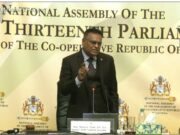Dear Editor,
I believe I am on record as saying that the results of this year’s general and regional elections have produced a seismic shift in the political landscape of Guyana. Perhaps I may have been too accommodating in that assessment.
Listen for instance to Madam Tabita Sarabo-Halley – in fact she should listen to herself! – lamenting the lack of adequate representation over the years in the configuration among opposition Commissioners on GECOM. But Madam, isn’t that representation what you and the WIN party, having gained the majority of seats in the opposition and consequently the post of Leader of the Opposition, should now be rightly entitled to, under the current Carter Formula? Or Madam Amanza Walton Desir, a lawyer and former presidential hopeful, tip-toeing around the issue and calling for the need for a conversation on it, when it is clear that the current decades-old composition “cyan wuk”!
A lot of the chatter from the experts who have surfaced to pronounce on this matter has focused almost exclusively on the appointees, those appointed as Commissioners under Article 161(3)(b) of the Constitution. The view is widely held that Commissioners can only be removed for reasons of sickness, mental illness, or misbehavior (Article 225(2)); in other words, the contention is that they are appointed for life!
This myopic approach fails to take account of the other side of the equation, that is to say, the appointer, who is the Leader of the Opposition at any given point in time, and certainly not the post-holder before 1 September 2025. While it might be correct that the options for removing the sitting opposition Commissioners are few, it cannot be the intendment of the draftsman that opposition Commissioners would remain in situ if their appointing authority, to wit the Leader of the Opposition, is no longer the same office-holder that first appointed them.
A commonsense interpretation alone of the representational character of GECOM Commissioners requires that the new Leader of the Opposition enjoys the flexibility to either retain existing Commissioners or replace them.
Therefore Madam Sarabo-Halley, there is nothing to lament; Madam Walton Desir, no need to be coy about this. As I said at the outset, we are indeed witnessing a seismic shift in our electoral landscape, which extends beyond representation in Parliament, into the representation on GECOM of ‘non-governmental political parties’, to use the language of Article 161(3)(b). The reality is that the configuration of GECOM as defined by the Carter Formula (three plus three) has been shared exclusively over the decades by the PPP and the PNC. This extension of partisanship in the composition of GECOM has come under criticism in the past by Election Observer Missions over the years. Now, we are in uncharted waters, as a third party producing a different Leader of the Opposition has eventuated.
How then could three Commissioners who were selected after a process – that is to say, their appointment was not automatic – by someone who is no longer the Leader of the Opposition, assume that they would automatically(?) continue to enjoy the confidence of the person soon to be nominated from among the other parliamentary members on the opposition benches, as the new Leader of the Opposition, going forward!?
Let’s go at this another way: if, by a concatenation of circumstances, the WIN party of Mr. Azruddin Mohamed had garnered the most votes in the election, making him the President, and Dr. Irfaan Ali’s PPP/C had garnered the second most votes, making him Leader of the Opposition, would the new President have been saddled with Messrs. Gunraj, Narayan and Rohee for the rest of their lives, as “his appointees” on the Commission? Would Messrs. Alexander, Corbin and Trotman, supposedly also appointed for life, then answer to Dr. Ali? I guess common sense is not so common after all…
Isn’t it the case that this contrived conundrum only arose, in the current configuration, because these three Commissioners happen to be on the same side of the aisle as the new Leader of the Opposition, but are not his appointees? Barring ill health or mental illness, would these three Commissioners realistically continue to serve as appointees on the opposition side, except for conduct unbecoming, notwithstanding the change in their appointing authority? How then would the provisions of Article 160(3)(b) be given full and meaningful effect, if the new Leader of the Opposition is unable to carry out his duty as appointor of three Commissioners? In so far as GECOM membership continues to be based on political representation, we are stuck in this impasse, which has only been made more challenging now, by the unprecedented arrival on the political scene of a major new third force.
The results of the 2025 elections dictate that the parliamentary representation on the opposition benches between 2020 and 2025 (mainly APNU/AFC) which had resulted in the (continued) appointment of three opposition Commissioners on GECOM, has now come to an end. Consequently, there is need for new appointments to GECOM by the new Leader of the Opposition, to reflect the WIN/APNU/FGM parliamentary representation. As the immediate way forward, pending any amendment to the unintended gridlock so often occasioned by the representational nature of GECOM membership, I wish to propose the following steps:
If the incoming Leader of the Opposition is so minded to retain any one of the current members on the Commission as a representative of the opposition, he should inform him in writing and duly inform the President as the ultimate appointing authority, as well as the Chairperson;
If any of the other two members, or all three, does not enjoy his confidence, the Leader of the Opposition should so inform them, thanking them for their service, and similarly inform the President as well as the Chairperson;
To fill the consequential vacancies, it is intended that the Leader of the Opposition hold meaningful consultations within the new opposition parliamentary configuration (APNU/FGM) before tendering his advice of nominees to His Excellency. Whether or not that means that either APNU or FGM is entitled to an opposition seat on the Commission is a matter for the consulting parties.
Yours sincerely,
Neville J. Bissember











